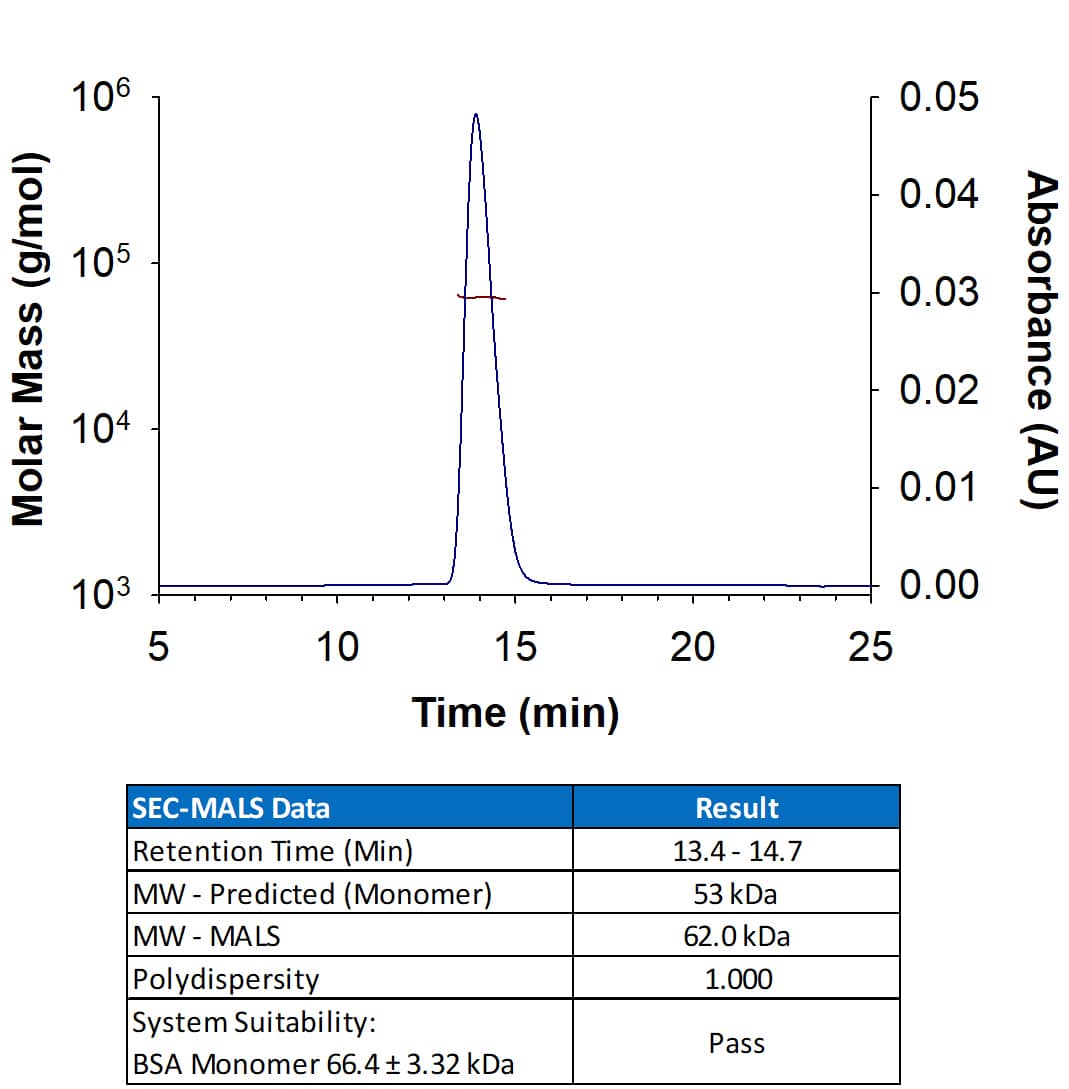Recombinant Mouse MuSK His-tag Protein, CF Summary
- R&D Systems HEK293-derived Recombinant Mouse MuSK His-tag Protein (11519-MK)
- Quality control testing to verify active proteins with lot specific assays by in-house scientists
- All R&D Systems proteins are covered with a 100% guarantee
Product Specifications
Glu22-Thr494, with a C-terminal 6-His tag
Analysis
Product Datasheets
Carrier Free
CF stands for Carrier Free (CF). We typically add Bovine Serum Albumin (BSA) as a carrier protein to our recombinant proteins. Adding a carrier protein enhances protein stability, increases shelf-life, and allows the recombinant protein to be stored at a more dilute concentration. The carrier free version does not contain BSA.
In general, we advise purchasing the recombinant protein with BSA for use in cell or tissue culture, or as an ELISA standard. In contrast, the carrier free protein is recommended for applications, in which the presence of BSA could interfere.
11519-MK
| Formulation | Supplied as a 0.2 μm filtered solution in PBS with Trehalose. |
| Shipping | The product is shipped with dry ice or equivalent. Upon receipt, store it immediately at the temperature recommended below. |
| Stability & Storage: | Use a manual defrost freezer and avoid repeated freeze-thaw cycles.
|
Scientific Data
 View Larger
View Larger
Recombinant Mouse MuSK His-tag (Catalog # 11519-MK) has a molecular weight (MW) of 62.0 kDa as analyzed by SEC-MALS, suggesting that this protein is a monomer. MW may differ from predicted MW due to post-translational modifications (PTMs) present (e.g. Glycosylation).
 View Larger
View Larger
Recombinant Mouse MuSK His-tag Protein (Catalog # 11519-MK) binds to Recombinant Mouse LRP-4 His-tag Protein (10229-LR) and Agrin His-tag Protein with an ED50 of 0.0800-0.800 μg/mL.
 View Larger
View Larger
2 μg/lane of Recombinant Mouse MuSK His-tag Protein (Catalog # 11519-MK) was resolved with SDS-PAGE under reducing (R) and non-reducing (NR) conditions and visualized by Coomassie® Blue staining, showing bands at 63 - 69 kDa.
Reconstitution Calculator
Background: MuSK
MuSK (muscle-specific kinase) is a 100-kDa type I transmembrane (TM) protein belonging to the receptor tyrosine kinase family (1). It is found in the postsynaptic membrane of skeletal muscle motor endplates (2). MuSK contains a 473 aa extracellular domain (ECD), a 21 aa transmembrane domain, and a 353 cytoplasmic domain. Human MuSK has multiple isoforms. One contains deletions at residues 307-394 and 454-461, while a second is a short soluble form that contains residues 120-209 plus a unique 24 aa Cterminal tail (3). Within the ECD, mouse MuSK shares 91% and 96% aa sequence identity with human and rat MuSK, respectively. MuSK is a crucial signaling molecule in the formation of the neuromuscular junction(NMJ). Defects in MuSK causes muscle weakness in congenital myathenic syndromes (4). MuSK binds the heparin sulfate proteoglycan agrin to promote acetylcholine receptor clustering. It has also been found to bind with low-density lipoprotein receptor-related protein 4 (LRP4) (5), Wnt ligands (6), Biglycan (7), ColQ (8) and BMPs(10). Recent studies have showed that MuSK does not bind agrin directly, but enhanced the MuSK-LRP4 interaction (8, 9). When agrin binds to the N-terminal region of LRP4, this promotes the association of LRP4 and MuSK, which then stimulates MuSK kinase activity (11, 12).
- Valenzuela, D.M. et al. (1995) Neuron 15:573.
- Finn, A.J. et al. (2003) Nat. Neurosci. 6:717.
- Nasrin, F. et al. (2014) Sci. Rep. 4:6841.
- DeChiara, T. et al. (1996) Cell 85:501.
- Kim, N. et al. (2008) Cell 135:334.
- Banerjee, S. et al. (2011) Development 138:3287.
- Amenta, A.R. et al. (2012) J. Neurosci. 32:2324.
- Otsuka, K. et al. (2015) Scientific Reports 5:13928.
- Zhang, B. et al. (2008) Neuron 60:285.
- Yilmaz, A. et al. (2016) Science Signaling 9:ra87.
- Zhang, W. et al. (2011) J. Biol. Chem. 286:40624.
- Burden, S.J. et al. (2017) CSH Perspectives Biol. 5:a009167.
FAQs
No product specific FAQs exist for this product, however you may
View all Proteins and Enzyme FAQsReviews for Recombinant Mouse MuSK His-tag Protein, CF
There are currently no reviews for this product. Be the first to review Recombinant Mouse MuSK His-tag Protein, CF and earn rewards!
Have you used Recombinant Mouse MuSK His-tag Protein, CF?
Submit a review and receive an Amazon gift card.
$25/€18/£15/$25CAN/¥75 Yuan/¥2500 Yen for a review with an image
$10/€7/£6/$10 CAD/¥70 Yuan/¥1110 Yen for a review without an image
